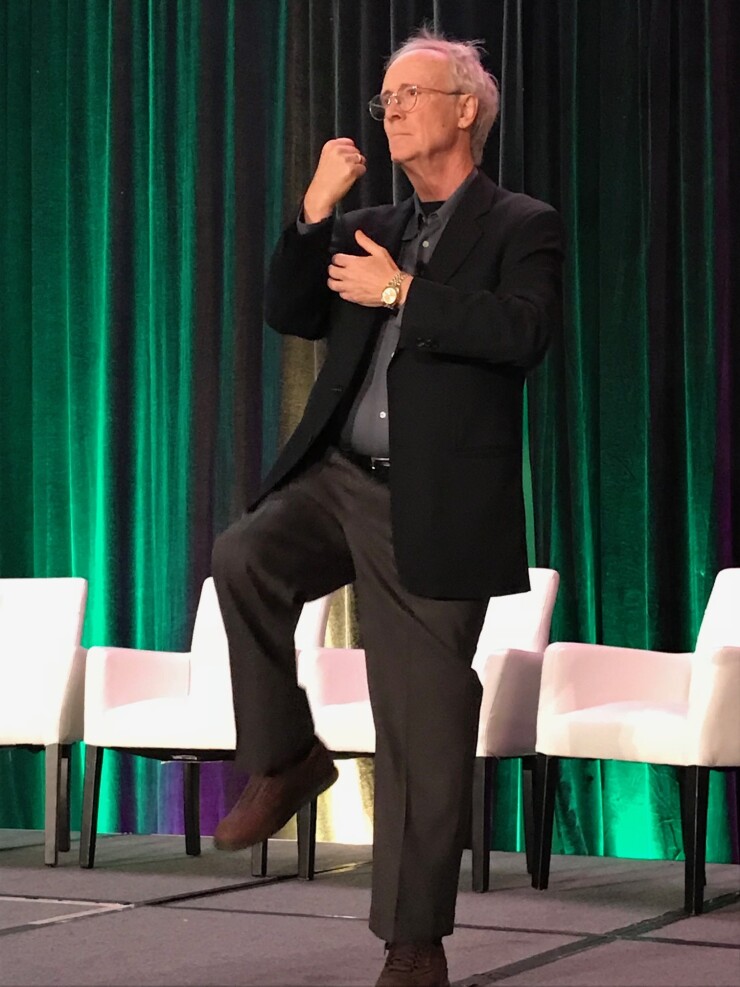PHILADELPHIA — Life planning pioneer George Kinder is embarking on a worldwide mission to spread the movement he helped start nearly 30 years ago. The world is ripe for such an undertaking, he says.
“We’re at a time of crisis, and it’s a crisis for the whole planet and a crisis for democracy,” Kinder said in an interview at NAPFA’s fall conference. “I think we have a choice, and the choice is, do we allow hierarchies of power to accumulate more power?”
Kinder, a driving force in life planning
The author of five books and founder of the Kinder Institute still instructs advisors on the principles of life planning, which its adherents say uses planning to help clients identify and live out their unmet dreams and aspirations.
Kinder aims to start a series of hundreds of conversations on these principles worldwide. In a speech before the fee-only advisors organization, he bemoaned the
“What happens to a civilization where the systems — the economic systems, the government and democracy systems and our systems of information — have no trust in them?” Kinder said. “What we really need to do is figure out a way to life-plan civilization. It’s time to do it.”
-
An FPA conference's keynote session began with Tai chi and classical music.
April 25 -
Sales of the fee-only products have expanded in a major way, but they have yet to win over advisors.
October 17 -
NAPFA’s chairman sees an “untapped market” opening up.
September 25
Educators at colleges featured in Financial Planning's annual schools list offer up their favorite titles for young and prospective planners.
Kinder’s book “Seven Stages of Money Maturity” inspired advisor Cristina Behrens about three years ago, when she was miserable as a mutual fund wholesaler, Behrens says. She attended one of Kinder’s five-day life planning trainings and launched her own RIA, Mana Financial Life Design, last month.
Behrens led a panel with Kinder at the NAPFA conference, and she believes Kinder’s methods have widespread applicability even though at first blush she thought they sounded “super crazy,” she says.
“If I had to summarize it in one word, it’s ‘purpose,’” says Behrens. “He helped me understand that the relationship to money doesn’t just belong to the wealthy, it belongs to everyone.”

Kinder and members of the movement will host meetings in coming months at churches, businesses and other places about a utopian concept he calls “A Golden Civilization,” also the title of his next book. He asks what systems and structures would allow society to reach this idealized vision in 1,000 years and which ones are leading it astray.
The necessary next step would be to do away with the harmful practices. He hopes discussions on these topics will attract people from all parts of the political spectrum and all cultures and eventually reach into the hundreds. There are tens of these meetings slated in the week leading up to the book’s March 4 release.
Entrepreneurialism is waning because society has “squirrelled it away” in institutions like venture capital and private equity, he said in his speech. Working together to build the idealized world will aid people’s freedom, restore integrity in society’s institutions and reduce inequality, according to Kinder.
“My argument is that, if we democratize entrepreneurial energy, that the innovation will be factors larger, much greater,” he said. “We think we’re in an innovative economy. I don’t think so. I think innovation is very small compared to what it could be, by democratizing entrepreneurial energy.”
He praises NAPFA as a “revolutionary” organization that “gave great hope” to fee-only advisors when it started 35 years ago, noting he’s “twice that age now and I’m not able to stop.”
Kinder is “ahead of his time,” and he’s “had a huge impact on the field,” according to advisor Steve Craffen, the chairman of NAPFA’s board. Life planning methods help steer clients beyond preconceived notions of the work done by advisors, agrees NAPFA CEO Geof Brown.
“So much of what we’re trying to combat is the client who comes in and wants to just focus on investments,” Brown says. “It allows you to make the conversation so much broader.”






